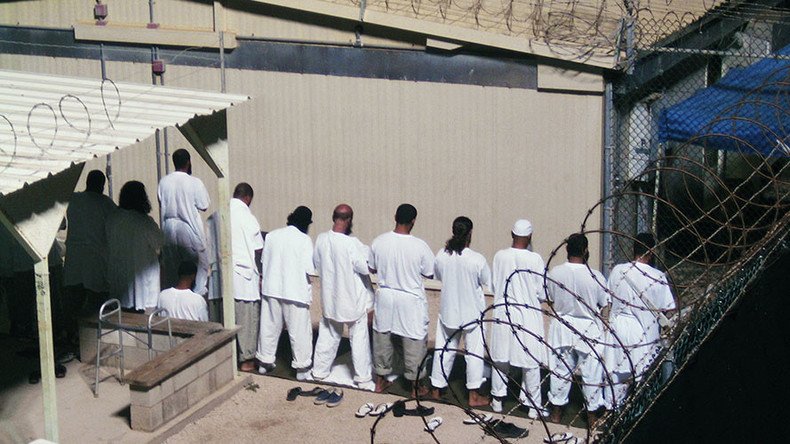Sleep deprivation, scaring with dogs, force feeding: Torture allegations as Gitmo turns 15

Exactly 15 years ago, the first inmates were transferred to the infamous Guantanamo prison, with the facility gaining an increasingly grim fame ever since due to reports of torture and abuse of the detainees.
With Guantanamo still operating, RT looks at some of the most disturbing techniques allegedly practiced with some of the inmates there.
Sleep deprivation
It was claimed that the inmates in the infamous prison have been stripped of sleep for days and even weeks. According to the UN Commission against Torture (CAT), sleep deprivation reduces the body’s ability to resist pain, thus making the person more liable to cooperation with investigators. It can also cause hallucinations, psychosis and lowered immunity.
CIA-tortured Zubaydah called to testify against #Gitmo harsh techniques https://t.co/0cGWSZJQLXpic.twitter.com/8DG5BbvHQG
— RT (@RT_com) May 27, 2016
Lawyers for the Gitmo inmate Salim Hamdan said in 2005 that their client was included in the so-called “Operation Sandman” in 2003 and deprived of sleep for at least 50 days. “Sleep deprivation of that nature for 50 days would constitute torture,” Joseph M. McMillan, one of Hamdan’s lawyers, said at the time.
In another case, Gitmo prisoner Mohammad Jawad was moved from cell to cell 112 times over the period of just 14 days in 2004. Jawad, a teenager at that time, was reduced to a state of sleepless disorientation, his lawyer Maj. David Frakt stated at the time.
Mental torture
Inmates in Gitmo have also been reportedly subjected to mental torture. During a court hearing in June 2016, a Somalian detainee and alleged al-Qaeda member Hassan Guleed, reaffirmed his earlier statement from 2004 that such tactics was applied to him in Gitmo’s Camp 7.
“We have mental torture in the Camp 7. In the [CIA] black site there was physical," he told the judge.
He also described a constant “stinky smell” in his cell as well as regular vibrations and sound similar to “like someone on the roof… hitting a hammer.” Guleed claimed that he was not the only one to suffer such techniques, with a few other detainees, including the alleged 9/11 mastermind Khalid Sheikh Mohammad also having been subjected to the tactics.
Use of dogs to ‘scare’ inmates
Interrogators in Guantanamo have also resorted to the use of dogs to scare the detainees, an FBI investigation into alleged abuses of prisoners revealed. In fact, the inquiry claimed that after the technique appeared to be a success, it was later applied in other US prisons abroad, such as the infamous Abu Ghraib in Iraq.
“I still see the dogs in my dreams – that they are coming for me and are going to bite me,” an inmate later described his fears of the tactics upon arrival at Guantanamo.
Hunger strike and force feeding of inmates
Guantanamo is reported to have faced numerous hunger strikes by the inmates, and the largest such action started in 2013. The act of defiance is thought to have started in response to abrupt confiscation of personal items by the wardens – including towels, family photos, books and even religious CDs. It has been estimated that up to 166 prisoners took part in the hunger strike at its peak.
To break the strike, prison authorities resorted to a highly controversial “force feeding” technique, which is prohibited by the World Medical Organization and was condemned by large numbers of doctors. The technique involves supplying of a nutritional substance via a tube passed through the nose or mouth into the stomach, causing severe pain to the person. Reports said that up to 45 inmates have been subjected to the practice.
RT was among the first news outlets to cover the story on the hunger strike and force-feeding, reaching out to US officials, human rights organizations and lawyers of the inmates in a bid to establish a picture of what was going in Gitmo.
Navy nurse faces expulsion after refusing to force feed Gitmo detainees http://t.co/XO9lylbnXz
— RT (@RT_com) September 16, 2014
“The force-feeding that my clients have experienced at Guantanamo, they’ve certainly described it as torture. The restraint chair that they’re strapped to, they’ve actually called ‘a torture chair,’” Ramzi Kassem, a Gitmo detainee lawyer told RT, commenting on the situation.
Polished reality
In a bid to lift the veil of secrecy on what is really going on in Guantanamo, RT’s Anastasia Churkina visited the infamous site back in 2013, from where she filed several reports. In fact, RT became one of the few media outlets allowed access to the facility.
Churkina noted that while “transparency’s a word brought up by all the personnel we talked to on the ground” she still faced serious restrictions while covering the story in Guantanamo. “At the end of each day, videos are reviewed, and any shots deemed unacceptable are deleted,” she said.
RT’s only opportunity to see a detainee was only through a dark-glass window and lasted for less than one minute. Authorities there told Churkina they did not want make the inmates “some curiosity on film.” Yet, when it came to the life of the staff of Guantanamo, RT was presented a much brighter picture, including sports facilities, a McDonalds restaurant and a radio station. “So, we learn we’re not the only ones simply being treated to a show,” Churkina commented.
Guantanamo prison still holds 55 inmates, according to the latest data, while 17 or 18 of them might be soon transferred from there, US President Barack Obama has recently announced. This, as a yearly sum to operate the facility costs US taxpayers about $445 million and expenditures for one detainee are estimated with $8 million annually.













